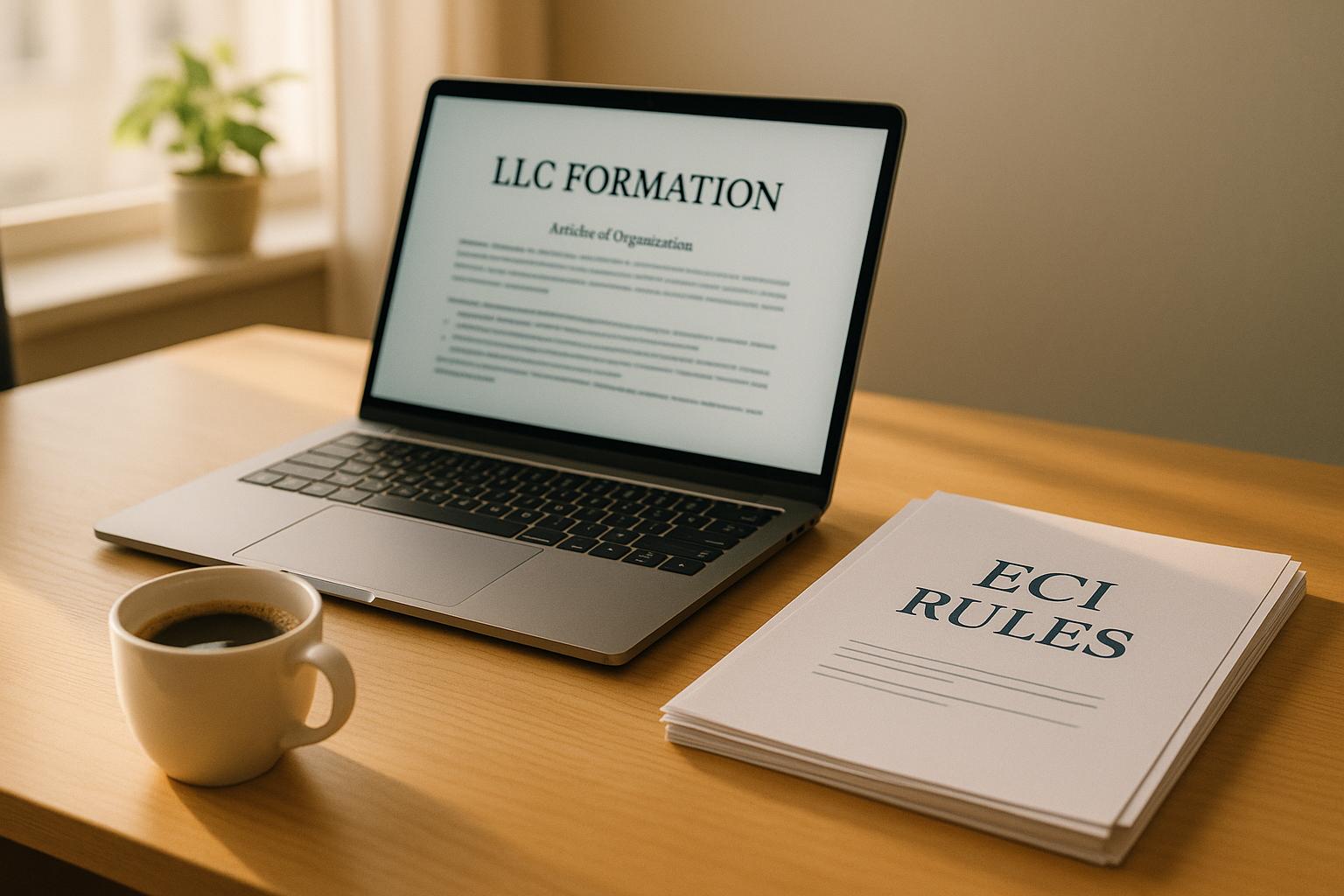Want to start an online business in the U.S. with an LLC? Here's what you need to know about ECI (Effectively Connected Income) rules:
-
Why Choose an LLC?
- Protects personal assets from business liabilities.
- Offers privacy and simplified management.
- Easier access to U.S. payment processors and vendors.
-
What is ECI?
- Income from U.S. business activities like sales, services, or digital products.
- Taxed at the same rates as U.S. citizens (10%–37%).
-
How to Stay Compliant:
- File the right forms (e.g., Form 1040-NR, Form 5472).
- Limit physical presence in the U.S. to under 120 days/year.
- Keep detailed financial and legal records.
-
Avoid Common Pitfalls:
- Don't hire U.S.-based employees.
- Distinguish ECI from FDAP (Fixed, Determinable, Annual, or Periodic) income.
Quick ECI vs. FDAP Comparison:
| Aspect | ECI | FDAP |
|---|---|---|
| Tax Rate | Graduated (10%-37%) | Flat 30% |
| Deductions | Allowed | Not allowed |
| Examples | U.S. sales, services | Royalties, dividends, rents |
| Forms | 1040-NR, 1120-F | 1042-S |
Effectively Connected Income (ECI) - International Tax ...
What is Effectively Connected Income (ECI)?
Effectively Connected Income (ECI) refers to income earned by non-resident aliens or foreign corporations through a U.S. trade or business.
ECI Definition and Scope
ECI includes earnings from activities like selling products or services through a business in the U.S.:
- Revenue from U.S.-based e-commerce sales
- Service fees from clients in the U.S.
- Income from digital products sold to U.S. customers
- Profits from inventory sold within the U.S.
The IRS taxes ECI using the same graduated rates that apply to U.S. citizens and residents. Business-related deductions are allowed, making accurate ECI classification important for managing taxes.
How to Check if Income Qualifies as ECI
The IRS applies two main tests to determine if income qualifies as ECI:
| Test Type | Purpose | Key Considerations |
|---|---|---|
| Asset-Use Test | Determines if income is tied to U.S. business assets | Assets must be actively used in U.S. business activities |
| Business-Activities Test | Evaluates if U.S. business operations contribute to income | Activities must play a significant role in generating income |
These tests help separate ECI from other income types.
"Generally, when a foreign person engages in a trade or business in the United States, all income from sources within the United States connected with the conduct of that trade or business is considered to be Effectively Connected Income (ECI)." - IRS
ECI vs. FDAP Income: Main Differences
It’s important to distinguish between ECI and Fixed, Determinable, Annual, or Periodical (FDAP) income, especially for LLC owners.
-
Tax Treatment
ECI allows deductions and is taxed at graduated rates. FDAP is taxed at a flat 30% rate on gross income with no deductions. -
Income Categories
- ECI: Includes revenue from U.S. product sales, service income, and business profits.
- FDAP: Covers interest, dividends, rental income, and royalties.
-
Filing Requirements
- Non-resident aliens report ECI on Form 1040-NR; foreign corporations use Form 1120-F.
- FDAP income is reported by withholding agents on Form 1042-S.
"ECI is taxed on a net basis, allowing deductions related to earning the income." - Mike Wallace, CEO at Greenback Expat Tax Services
Understanding these differences is key to meeting tax obligations and planning effectively.
ECI Tax Rules for Online Business LLCs
Federal ECI Tax Requirements
Foreign-owned LLCs with effectively connected income (ECI) must file federal taxes using the same graduated rates as U.S. citizens and residents, after accounting for business deductions.
The required forms and conditions vary depending on the LLC structure:
| LLC Type | Required Forms | Other Requirements |
|---|---|---|
| Single-Member LLC | Form 1040-NR; Pro forma Form 1120 | Form 5472 |
| Multi-Member LLC | Form 1065 | Schedules K-1, K-2, K-3 |
| Foreign-Owned Corporation | Form 1120-F | – |
Maintaining accurate records is critical. In addition to federal rules, state regulations must also be followed to ensure compliance.
State-Level ECI Tax Rules
States determine tax jurisdiction using two primary methods:
- Physical Presence Nexus: This applies when a business has property, employees, or inventory located in the state. For example, if an online retailer stores products in a California fulfillment center, it creates a physical nexus in California.
- Economic Nexus: Even without a physical presence, states may require tax registration if sales exceed certain thresholds.
Some states focus solely on taxing ECI, while others may tax worldwide income, regardless of treaty protections.
Tax Treaties and ECI Rules
After meeting domestic tax obligations, tax treaties can help ease withholding requirements.
| Country | Without Treaty | With Treaty Benefits |
|---|---|---|
| Germany | 25% withholding on royalties | Reduced to 0% with Form 6166 |
| Canada | 25% withholding on interest | Lower rate with proper documentation |
| Japan | Standard dividend withholding | Reduced rates available under the treaty |
To take advantage of treaty benefits:
- File Form 8832 to elect corporate treatment for your LLC.
- Submit Form 1120 and Form 5472 to remain compliant.
- Obtain Form 6166 from the IRS to certify U.S. tax residency.
Keep in mind, electing corporate status means your LLC will be taxed at a 21% corporate tax rate on worldwide income. It's a good idea to consult a tax expert before making this decision.
sbb-itb-fcd17fe
How to Follow ECI Rules
Required Tax Forms for ECI
Depending on your LLC type, you’ll need to file specific IRS forms to report ECI. Here's a breakdown:
| LLC Type | Primary Forms | Additional Requirements |
|---|---|---|
| Single-Member Foreign-Owned | Form 1040-NR | Pro forma Form 1120, Form 5472 |
| Multi-Member | Form 1065 | Schedules K-1, K-2, K-3 |
| Foreign Corporation | Form 1120-F | Schedules H, I, P |
For foreign corporations filing Form 1120-F, you’ll need to include Schedules H, I, and P to allocate deductions, interest expenses, and partnership interests.
ECI Documentation Requirements
To stay compliant, you must keep detailed records of all business activities. Here's what to focus on:
-
Financial Documentation
- Income statements showing U.S.-sourced revenue
- Bank statements from U.S. financial institutions
- Receipts and invoices for business expenses
- Documentation of transactions with related parties
-
Legal Documentation
- LLC formation documents
- Form W-8BEN to confirm foreign status
- Tax treaty certification documents
- State tax registration certificates
-
Transaction Records
- Records of dealings with U.S. customers
- Transactions involving related foreign entities
- Agreements with business partners and service providers
Keeping these records organized helps ensure compliance and simplifies tax reporting.
Tools for ECI Compliance
Once your documentation is in order, use accounting software to make ECI management easier. Tools like QuickBooks or Xero can help you track income, expenses, and transactions, making tax form preparation and record-keeping much more manageable. These tools can save time and reduce errors in managing your ECI obligations.
LLC Structure Options for ECI
Selecting Your LLC Type
The structure of your LLC plays a big role in how ECI (Effectively Connected Income) is taxed and reported. Each type comes with its own set of rules and responsibilities:
| LLC Structure | Tax Treatment | ECI Reporting Requirements | Key Points |
|---|---|---|---|
| Single-Member LLC | Disregarded Entity | Proforma 1120 and Form 5472 | Simple setup with direct income pass-through |
| Multi-Member LLC | Partnership | Form 1065 with Schedules K-1, K-2, K-3 | Shared liability; more detailed reporting |
| Corporate Election LLC | Corporation | Form 1120-F | Offers liability protection; may involve double taxation |
For online businesses generating significant U.S. revenue, a Single-Member LLC is often the easiest option to manage. However, if you're planning to grow quickly or attract investors, a Multi-Member LLC could be a better fit, even with its added reporting complexity. Once you've chosen your LLC type, managing your U.S. presence becomes critical for staying compliant.
Managing U.S. Business Presence
Your LLC's physical presence in the U.S. has a direct impact on your tax obligations. To stay compliant and optimize your tax strategy, consider the following:
Physical Presence Management
- Clearly document where services are performed.
- Track income from U.S. versus non-U.S. sources.
- Be mindful of state-specific economic nexus thresholds.
By clearly defining your business's physical presence and income sources, you'll establish a strong foundation for compliance.
Income Source Tracking
- Separate ECI from Fixed, Determinable, Annual, or Periodic (FDAP) income.
- Keep records of foreign-sourced income that isn’t subject to U.S. taxes.
- Use accounting software to categorize income accurately.
For example, services performed entirely outside the U.S. are usually considered foreign-sourced and are not subject to U.S. tax withholding.
LLC Growth and Compliance
As your business grows, staying compliant with ECI regulations can become more challenging. Pay attention to these areas:
Documentation Requirements
- Keep all foreign status forms up to date.
- Maintain detailed records of transactions with foreign-related parties.
- Document all income sources thoroughly.
Adjusting Your LLC Structure
- Start with a Single-Member LLC for simplicity.
- Switch to a Multi-Member LLC if you add partners.
- Choose corporate status for larger-scale operations.
If your business exceeds state economic nexus thresholds, you’ll need to adjust your compliance strategy. For example, foreign-owned Single-Member LLCs must consistently file Form 5472 to report transactions with their foreign owner. As your business grows, staying on top of these evolving requirements is crucial.
Conclusion: Managing ECI Rules for Your LLC
Managing your LLC's effectively connected income (ECI) involves staying on top of tax obligations and compliance requirements. Foreign-owned LLCs, in particular, must adhere to ECI rules to avoid hefty penalties of up to $25,000.
Key Compliance Steps
Keep detailed records of transactions involving foreign owners and use accounting tools to separate U.S.-sourced income from foreign-sourced income. For example, selling through Amazon FBA doesn’t automatically qualify as engaging in a U.S. trade or business unless there’s substantial physical activity in the U.S.. These practices will help you stay aligned with deadlines and compliance obligations.
Staying Protected
To ensure compliance, follow these steps:
- File Form 5472 and Proforma 1120 annually (as previously outlined).
- Submit Form W-8BEN to confirm foreign ownership.
- File protective returns if your U.S. business activities are uncertain.
- Keep thorough records of all financial transactions.
- Work with tax professionals who specialize in international tax matters.
FAQs
What are the key benefits of forming an LLC for your online business in the U.S.?
Forming an LLC for your online business in the U.S. offers several key benefits. Limited liability protection ensures your personal assets are safeguarded from business debts or lawsuits. Additionally, LLCs provide tax flexibility, allowing you to choose how you’re taxed - either as a sole proprietorship, partnership, or corporation - depending on what works best for your situation.
LLCs are also known for their simple and flexible management structure, making them easier to operate compared to corporations. They can enhance your business’s credibility with customers and partners, and in some cases, offer privacy protections depending on state laws. If you’re looking to grow, LLCs can also make it easier to attract investors and access the U.S. market efficiently.
These advantages make LLCs a popular choice for online entrepreneurs navigating legal and tax considerations while building their ventures.
How do I know if my income is classified as Effectively Connected Income (ECI) for U.S. taxes?
To determine if your income qualifies as Effectively Connected Income (ECI) for U.S. tax purposes, you’ll need to evaluate it using two key tests: the asset-use test and the business-activities test.
- The asset-use test checks if the income comes from assets that are used in, or held for use in, a U.S. trade or business.
- The business-activities test assesses whether the activities of your U.S. trade or business played a significant role in generating the income.
If your income meets the criteria of either test, it is likely considered ECI and subject to U.S. taxation. For specific guidance, consult a tax professional familiar with ECI rules to ensure compliance with U.S. tax laws.
What steps should I follow to ensure my foreign-owned LLC complies with U.S. ECI tax rules?
To keep your foreign-owned LLC compliant with U.S. ECI (Effectively Connected Income) tax regulations, follow these key steps:
- Determine if your income qualifies as ECI: ECI refers to income tied to a U.S. trade or business and is generally taxable. If your business activities are conducted outside the U.S. without a U.S. fixed base, your income likely isn’t classified as ECI.
- File the correct tax forms: Single-member foreign-owned LLCs must file Proforma 1120 and Form 5472 to report transactions with foreign owners. Multi-member LLCs must file Form 1065, including Schedules K-2 and K-3 for income allocation.
- Ensure proper withholding: If your LLC has ECI, partnerships must withhold applicable taxes, and foreign partners should report their share on Form 1040NR.
- Maintain accurate records: Use Form W-8BEN to confirm foreign status and ensure all documentation is clear and up to date.
- Consider filing a protective return: If you're uncertain whether your activities create a U.S. trade or business, filing a protective return (Form 1040NR) can help avoid penalties.
Staying informed about federal and state tax obligations is crucial to avoid compliance issues. Consult a tax professional to ensure your LLC meets all requirements.

.svg)




